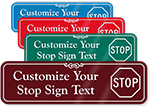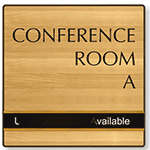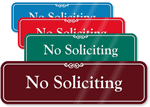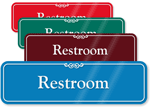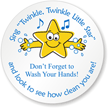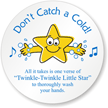1
Most people know that hand washing is proper behavior. Why do you think that so many bathroom users just don't do it?
Well, studies have actually been done. They've put hidden cameras in bathrooms to look at the behavior of people in bathrooms. The first thing to say is that women are better than men. People in public bathrooms are better than at home, where they tend to think that their facilities are cleaner to begin with. Still, fewer than 25% of surveyed adults using public bathrooms washed their hands. I think the answer is that we have done almost too good a job of educating the public to the risks of other people's germs, rather than also teaching them our responsibility to protect others from our germs. What people tend to do is leave the bathroom and find somewhere to wash their hands when they're outside the bathroom, because they worry that the bathroom door handle is dirty. What we advise is that you may not find the sink before you touch your face and potentially infect yourself with someone else's germs. And it's not just toilet germs - it's common cold and flu germs that we're actually more worried about transmitting. You can get that anywhere where someone has touched an inanimate object with dirty hands. What we recommend is that you do carefully wash your hands in the bathroom and then use a paper towel to open the door.
2
As a pediatrician, have you discovered any successful motivation techniques to get kids to consistently wash – maybe a fragrant or fun hand soap, or some signs that cater to children?
I think signs are always a good idea for those kids old enough to read. Signs remind them and cute, cartoon character signs I think are helpful reminders. But, the best trick that parents have found over the years is to teach kids to sing the happy birthday song or "Twinkle, Twinkle Little Star." They each last about twenty seconds and what we recommend for kids is that you run the soap and water over your hands for at least twenty seconds. Then carefully rinse and dry. We're grateful if kids do it for five seconds but what we recommend is twenty seconds. "Twinkle, Twinkle Little Star" gets them through that.
Twenty seconds of total exposure to washing or twenty seconds of scrubbing and then rinsing off after that?
We'll take twenty seconds of basically anything. You turn the faucet on; you wet your hands; you soap them; and then you scrub from fingernails to wrists. It's remarkable actually how long twenty seconds is when you try that. If they'll do twenty seconds and then a rinse afterwards - twenty seconds of getting themselves lathered up from fingertip to wrist and then do a rinse – we'll be very happy that they've done a good job.
3
Adam Grant, an organizational psychologist, once ran a study on which hand washing signs hospital employees responded to best. He found that the signs that focus on protecting patients worked nearly 10% better than those that focus on protecting the worker. An example of one of our bestselling signs is one that says, "Your hand hygiene prevents patients from catching diseases." Would you know which signs are most prevalent in Children's Hospital? Is there a certain legend that you feel works best?
I think that Adam is right. We all have a sense of responsibility for patients, particularly people who work in hospitals. We do have signs in Children's Hospital about protecting patients. There are signs in restaurants to protect customers and fellow workers, too. I think in general it's fair to say that hospital workers are more conscientious. There is also a tremendous financial incentive right now: the government will withhold vital support for hospital programs if there is an excess rate of infections in hospitals. Hospitals are doubling down on trying to get proper hand hygiene everywhere in bathrooms, but also on the wards, to prevent them from not only infecting patients but from losing funding.
4
Is washing with hot water better than cold water?
I think washing with whatever temperature is comfortable is best, because the act of washing is what's important. This is a physical removal of germs. You're not trying to burn the germs off your hands with hot water. You're trying to physically, with lather, remove as many germs as possible. A tepid temperature, or a warm temperature, that will let you spend more time under the sink comfortably is the right way. You can't make the water hot enough to kill the germs and not burn yourself. It really isn't a matter of killing germs. It's a matter of comfort in how much time you can spend washing.
5
Is it more the scrubbing action that kills the germs or bacteria from the soap?
There are two germ-fighting approaches. Hand washing takes care of both of them. One of them is, as you said, killing the germs. There are anti-bacterial soaps that kill, they advertise, 99.9% of germs. They contain an antibiotic. That antibiotic actually kills the germs. Then there's the physical act of manually removing the germs by the scrubbing, by your own actions of one hand rubbing against the other, in a thorough way under water with soap. Soap opsonizes it. It loosens it, just as it does with grease. It loosens the dirt and the germs and you wash them away. People have done studies and your hands have fewer living germs after using an antibacterial soap than after using a regular soap. But no one has shown that there is a reduction in the number of infections because of using an antibacterial soap. So, it's hard to find non-bacterial soaps anymore. Everything has got an antibiotic in it. If you use a non-antibacterial soap, but you use it effectively, you're not posing a greater risk to yourself or others for infections. You're killing fewer germs, but they're probably not the germs that are going to cause infections.
6
In your book, Germ Proof Your Kids, you talk about the difference between hand soap and liquid soap, or soap in bar form versus soap in a bottle. Can you talk a little about that and which is best?
Bar soap is fine except that it sits in a soap dish, and a soap dish is like a culture medium. Germs love the gooey mix of a soap dish because nobody's using the physical pressure to remove the germs, so they can grow in that soap dish. Liquid soap is more hygienic because it doesn't fester the germs in a tub that they're comfortable growing in.
7
Going back to Germ Proof Your Kids - you talk about the hygiene hypothesis. Can you tell us briefly what it is and how much truth there is to that?
People have thought that there are two truths. One truth is that we are seeing, as a society, a higher rate of allergic disorders and immunologic disorders - asthma, for example, and hay fever - in increasing numbers. That's one truth. The other truth is that we are a more hygienic society. We are washing our hands more. We are using antibacterial soaps. We use more antibiotics. People have hypothesized that the two are related: there is more in the way of immunologic dysfunction because we are a cleaner society. They point to different parts of the world where there doesn't seem to be as much hygiene and there doesn't seem to be as much allergy. The problem with the hypothesis is that I think it's similar to saying that everyone who ate pickles in 1875 is dead. That's true - they ate pickles and they're dead. The question is, are the two related?
Right, causation versus correlation.
Exactly, it's very hard to prove causation with the hygiene hypothesis. There is a correlation, but it's very hard to prove causation. And, Ive never met a child who is too clean. I really believe that we get exposed to plenty of stimulations to our immune system that will allow us to develop a healthy immune system. I think we have to look for other reasons to explain the increased allergies and asthma incidences we're seeing.
Plus, people will probably use the hypothesis as an excuse to be less clean. You don't want people to go down that road.
I think that's true. People have also used the hygiene hypothesis to argue against immunizations of children. They say, "If we're protecting our kids, kids need to be exposed to germs. If we're protecting them against too many germs, they're going to develop these di¬s-regulations of their immune system." That entire argument is facetious.
8
Okay, tell us a little bit about the efficacy of hand sanitizer. Is it as good as hand soap? When should you use it as opposed to soap?
Alcohol hand sanitizers are very effective. They're effective in several ways that are more effective than soap. For example, antibacterial soap doesn't treat viruses. Viruses are what cause colds and flu. You can use antibacterial soap until your hands are chaffed but you're not going to kill the flu viruses on your hand. On the other hand, you will wash the flu virus away. Washing your hands is good, but you don't need an antibacterial soap to wash your hands. You will wash away cold and flu viruses just by the physical act of washing your hands. Washing your hands does treat or prevent transmission of colds and viruses, but it doesn't kill the viruses.

In contrast, hand sanitizer does kill the viruses. It's not as good at lifting up (dirt). For example, you couldn't use alcohol hand sanitizer to clean your hands after they've been in mud, because it just makes a gooey mess. It doesn't clean your hands. You need soap and water and there are a lot of germs in mud. There's a role for both. What I recommend is hand sanitizers should be available to you in places where you don't have soap and water. Keep them in the glove compartment of the car. Keep them in your hand bag. Keep them on your desk at work. You don't have to, every time you touch a doorknob, use hand sanitizer. That's silly. But after you've had contact with a lot of people: you've been to a meeting and shaken hands with all the other people at the meeting, go back to your desk and squirt the hand sanitizer on. Rub it in well and kill the viruses that have just been passed to you before you touch your face and get the cold that the guy across the room had (and then shook your hand afterward). I think even though there's soap and water in the house it's a good idea to put hand sanitizer in the rooms where there's no soap and water. For example, if you go into the child's room, put a bottle of hand sanitizer near the doorway. When you leave your sick child's room you don't have to get sick. You squirt the hand sanitizer on, can protect yourself, and not miss work.
9
Say you're leaving the bathroom. You don't have a towel to open the doorknob with, so you have to touch the doorknob that maybe the last guy touched without washing his hands. You come back to your desk. Should you put hand sanitizer on in that situation?
Absolutely - whenever you feel as if you have been in touch with high risk surfaces. The high risk surface may be a dozen hands. My wife and I watch Jay Leno's monologue some nights. He comes out and gives high fives to everybody who runs down from the audience. Then he puts his hands right in his pocket. We're sure that he's got hand sanitizer that he's squirting on his hands in his pockets. Then he takes his hands out of his pockets and he rubs his hands like this before he begins his monologue. It's to protect himself, we're sure, from the multiple hands that he's just had contact with.
10
In Germ Proof Your Kids, you talk about hot spots for attracting germs. Can you give us a few examples of where people should be the most germ-phobic?
There are spots inside the house and there are spots outside the house. Hotspots inside the house are the kitchen and bathroom. We are naive about how many infections we transmit in the kitchen. Everybody's conscience about the bathroom. We are naive about how frequently food poisoning actually begins in the house. 90% of salmonellae infectious occur in the home. It may be stuff that you brought in from outside, but it's the way it was prepared, the counter tops that you prepared it on – the knives, the disk racks that you used. Kitchen hygiene is a way to combat the kitchen hotspot. Similarly, even though you think your bathrooms cleaner, it's a good idea to wash your hands when you come out of your bathroom as well. Outside - any public area that has lots of hand contact. People are also correct to be concerned about the shopping cart handles where everybody puts their hands on it. I don't think we need to put the shopping cart through a car wash as some supermarkets are actually doing. They put the carts through a wash after every run. They put them in the dirty line, and then they get washed and come out clean. I think that's a little bit excessive. If people feel more comfortable wiping off the shopping cart handle with an alcohol swab before they use the shopping cart, that's a good idea. A better idea is probably just to not touch your face while you're shopping. Then, when you get in the car, open the glove compartment and take out the hand sanitizer.
Would you recommend always having hand sanitizer on you?
Not on you but accessible to you. At your desk at work, in the glove compartment, in your handbag. Some place where you can go for it when there's no sink but you think you would probably like one if there was one.
11
Let's move on to sneezing. How dangerous is it? Do we have to teach kids to sneeze better, or is that a hopeless feat?
I don't know if we need to teach them to sneeze better. We need to un-teach them what we taught a whole generation or two which is to sneeze into your hands. We definitely don't want to do that. We want to sneeze into our elbows. It doesn't do anything for the child who's sneezing, but it does something for the other 15 kids on the playground whose hands will not be contaminated by this child. A sneeze travels about three feet in radius around you. If you're the center of the circle, three feet in all directions is about how far the germs in a sneeze fall. Those germs, when they land on a surface, are potentially infectious as long as that surface is moist and the contact comes within a few minutes. Some germs can even live for a few hours on moist surfaces. We're talking about cold and flu germs, so these are viruses not bacteria. If you've been in contact with lots of surfaces, before you sit down to each lunch, use hand sanitizer or wash your hands well with soap and water.
12
You mention how there are different types of germs. There are cold and flu germs. Tell us about the effect that not washing has on the spread of the cold and flu.
Hand washing will prevent the spread of cold and flu and not hand washing will not. It's fairly straightforward. If you are with someone who has a cold and you hold hands or open the door of their apartment that they've been using and you then put your hands to your face as we do some 100s of times a day. (People have done videotapes of classrooms and lecture halls and it's remarkable how many times we touch our face). We have to be conscience of the fact that if we touch our face and haven't washed before that we are potentially infecting ourselves with something we picked up from someone else's hands or an inanimate surface. Not washing our hands will increase our incidence of colds and flu.
It's when you touch your face, that's when you can really pick up a virus.
That's right, because the viruses get into our eyes; they get into our nose; they get into our mouth. They don't get into our ears, but they get into the mucous membranes of our face.
13
When, exactly, does flu season start and why is it more prominent in the winter months?
Those are really good questions. It starts as early as late September, early October. Those are the earliest cases we see. It can run all the way through May. The peak of the season really is December through March. That's when we primarily see it. There have been studies that the flu virus grows better in cooler temperatures, so one hypothesis is the virus itself is more prolific in colder weather. The other hypothesis is that in cold weather we're all closer to each other. We're packed into classrooms. We're not outdoors where it's harder to spread viruses, because there's that dilution effect of being outside in open spaces. When you're coughing, sneezing, and giving each other high fives, not on a playground but inside, in the gym, where everybody is packed on cold, snowy days, or in the classroom where there's an indoor recess. That's where kids tend to transmit the flu.
We're based in New York City, and it gets a lot denser during the wintertime because people aren't traveling. During the summertime, on the weekends, the city feels empty. That may have an effect.
At a city level, that's exactly right. As opposed to in your home or in your school, you're exactly right. That is, everything's denser in the winter.
I would think that germs can live for longer periods of time in moisture. Aren't humidity levels greater in the summer than the wintertime?
It depends where you live. Generally, that's true. Germs do like moisture. Viruses are not as predictable. Remember, the moisture they like is in our body. They like the moisture in our nose; they like the moisture in our mouth; they like the moisture in our eyes. That moisture is pretty much the same at all times of the year.
14
I know you're a big proponent of the flu shot. Can you tell our readers how it works and why it's important?
The flu shot is an immunization that changes every year. It changes, in contrast for example, to the polio vaccine which is the same from year to year, or diphtheria, or pertussis, or tetanus, which is the same from year to year; that's because those bugs don't change from year to year. But flu changes every year. It's a very smart virus. It mutates and the strain that emerges from the multiple mutations the virus goes through is a little bit different many years. Some years, it's the same as the year before but, many years it's different. Unlike the other childhood and adult immunization where you take once and don't take again from five years to life, the flu shot you have to take every year. It's an anticipatory shot. The flu vaccine is designed based on the first strains that are seen in the southern hemisphere. We haven't gotten those strains yet, and we anticipate those will be the strains that are the most prominent in the northern hemisphere, when they come here; and vice versa. The flu shot in the southern hemisphere is based on what we've seen the previous season in the northern hemisphere. It's an important shot. It's not 100% effective, but it's 70+% effective and that will cut down a lot of episodes of flu.
Will taking it get you sick?
There have been lots of anecdotes people have. "I was fine; I took the shot and I got sick." They just don't hold up. Everybody has different reactions to vaccines. Some people do feel a little feverish or pain at the site of immunization after taking many different shots. The flu shot, people have said, "I got the flu from taking the flu shot." No, you didn't get the flu but you might have had an immunologic reaction to the vaccine contents that was a little like the immunologic reaction that you have with the flu. You may feel a little bit punk afterwards, but you didn't get the flu and you're going to feel a lot better than had you gotten the flu.
15
Apart from hand washing and the flu shot, do you have any secrets for me to decrease my chances of catching the flu?
It's all the things that grandparents recommended, that we "poopooed" and said, "That's not going to hold up." You need to dress warm when it's cold outside. There have been great studies that show exposure to cold, if you're harboring the cold virus, increases your chances of developing symptoms. Everybody at periods of time are exposed to the virus, but if you take a cold hit – improper dress, for example - at the time that you're harboring the virus you may have as much as a threefold increased chance of getting sick from that virus. You wouldn't have even known you had it before. Proper nutrition is very important. Vitamin C will help reduce the duration of cold. It will not prevent you from getting it but will help reduce the duration, if you have a diet that's rich in Vitamin C that you take every day - even before you get the cold. Regular, daily exercise 45 minutes a day, five times a week will cut your incidence of colds and flu by half, some studies have shown. Regular exercise; dress for the weather; have proper nutrition; and, finally, sleep. Sleep deprived individuals get more colds and flu.
When you have a cold is it in fact beneficial to exercise and sweat it out?"
No, it's a break even. If what you've got is limited to the head and neck, it's probably okay to exercise; it won't make you feel better faster, and it won't make you sicker. If you've got illness that's below the neck – a bad cough, certainly if you have a fever - then you don't want to push yourself. You don't want to exercise when you've got flu-like, below-the-neck symptoms.
16
As a pediatrician, have you found that pediatricians often get sick from their kid patients? What precautions do you take to not get sick from your patients?
My hands are raw from alcohol hand sanitizer, first of all. It's very, very effective. By the time you've been in practice for 15 or 20 years you've seen most of the stuff that comes along, germ-wise. Like other adults in that age group, you're less likely to become infected. When you first start practice, like when you're first a parent for example, you're sick constantly. The best you can do is try and sanitize your hands and be conscious of the fact that if you touch your face you're likely to infect yourself with something that the kids had. Yes, we get sick and then we get over it.
17
Did you find that you were successful in teaching your kids about germs? Is there anything you would have done differently to make them more germ proof?
This is one of those times where you knock and wood and throw salt over your shoulder so you don't jinx things. My kids got through childhood without being sick too much. I don't remember more than a few sick days through all of K-12 education. I don't know if that's because we taught them well or because the school was attentive to those kinds of things, or if we were just lucky. We tried to tell them what to do. It's hard to teach six and seven year-olds how to not touch their face and wash their hands in between. We could not possibly have done that good a job, so it was probably luck.
18
Do you feel like you get sick less often than most of your peers?
Yes.


